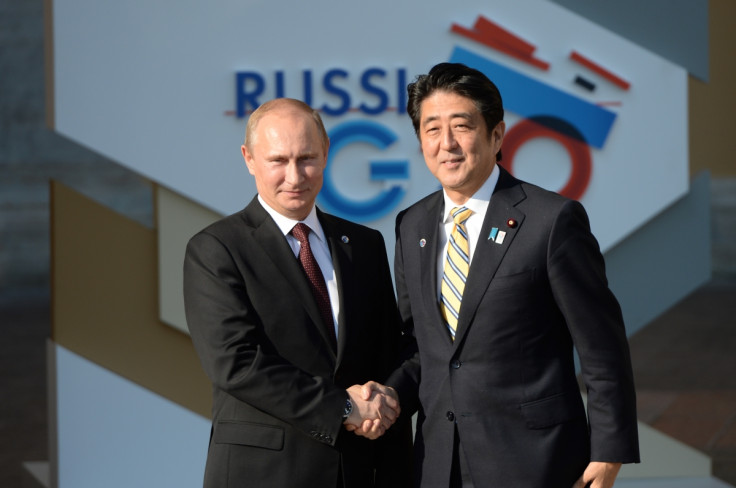Kuril Islands dispute: Why are Japan and Russia still locked in WWII over the territories?

Russian President Vladimir Putin is set to meet with Japanese Prime Minister Shinzo Abe in the Black Sea resort of Sochi on 6 May. For three years, Japanese and Russian officials are believed to have pushed for a meeting between the leaders, raising questions as to whether the rare bilateral will result in the signing of a peace treaty.
During the meeting, President Putin and Prime Minister Shinzo are expected to discuss the 70-year-old dispute over four islands in the Pacific Ocean, captured by the Soviet Union at the end of Second World War. It is because of this territorial dispute that Russia and Japan have never signed a peace treaty to end Second World War hostilities.
Ahead of the talks, a statement released by the Russian government said: "The current situation and prospects for developing bilateral relations in trade, the economy and humanitarian sphere will be subjects of discussion at the upcoming talks. The leaders of Russia and Japan are also to hold an in-depth exchange of opinions on topical international issues."
What is the Kuril Islands dispute about?
The four disputed islands are referred to as the Southern Kurils by Russia and the Northern Territories by Japan. They are called Kunashir (Kunashiri), Iturup (Etorofu), Shikotan and the Habomai group. The southern tip of the Habomai islands are just off the coast of the Japanese island of Hokkaido.
According to the BBC, Japanese people inhabited the islands in the 18<sup>th and 19<sup>th Centuries and at the time of the Second World War three of the islands hosted roughly 17,000 Japanese people. Russia and Japan signed the Treaty of Shimoda in 1855, which officially handed over ownership of the four southern islands to Japan, while Russia would own everything north of it. However, at the end of the Second World War, Soviet soldiers captured the islands and deported all the residents to Japan.
Although the Japan-Soviet Joint Declaration was signed between the two countries in 1956, a formal peace deal was never agreed to because of the territorial dispute over the islands. Although Russia proposed a deal to return two of the islands to Japanese ownership, this was rejected by Japan on the grounds that the two islands accounted for only 7% of the disputed territory.
What is Japan's stance on the dispute?
Japan has insisted that a peace treaty cannot be signed until the dispute is resolved. Japanese media has stated that reaching a resolution on the territorial dispute is a political priority for Prime Minister Abe.
Ahead of the talks, Prime Minister Abe said: "I shall persevere in continuing negotiations based on the basic trend of resolving the issue of the ownership of four islands and signing of the peace treaty, I want to resolve the problem."
What is Russia's stance on the dispute?
At least 30,000 Russians are now said to be living on the islands alongside a Russian military presence in Iturup. While chances of resolving the issue look less than hopeful, President Putin did, in 2004, indicate that the offer to return two of the southern islands was still an option.
During a visit to Tokyo in April, Russian Foreign Minister Sergie Lavror said that, while Russia wanted to "move forward" in relations with Japan, it was not prepared to budge on the "result of World War II".
"This issue is complex and not just one meeting or one round of consultations at the level of foreign ministries will be required to reach mutually acceptable settlement," Putin's chief foreign policy advisor, Yury Ushakov, said ahead of the talks. "But in order to make progress in solving it, it is necessary to create a positive, constructive atmosphere of bilateral relations, which could bring both sides closer to each other rather than moving them farther away from each other in solving the problem."
© Copyright IBTimes 2025. All rights reserved.






















